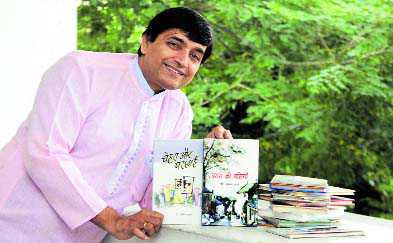When did you start feeling that you were born to be a storyteller, not a medical professional?
I have been writing since my school days, but these were not professional writings. After completing my BAMS from GNDU in 1985, I carried on with my hobby, which later turned into a passion and I published my first literary work in 1993 - a short story book in Punjabi, titled 'Lakir De Aar Par'. After that a short story in Punjabi, '26 Inch Da Cycle' got translated into Bengali. A book was later added in the syllabus of the comparative literature study of Tripura University.
You started your career as a fictional writer with Punjabi language. How did you turn into a Hindi novelist?
Initially, I had no command over any language. I was as good in Hindi as I was in Punjabi. But I wanted to reach to general readers. I studied languages, including Hindi, Punjabi and English till Class XI only. As Hindi is our National Language and a language that builds a link among people of various states, I thought I could tell stories of Punjab to everyone in the country. I think writing in Hindi can convey messages at the national level.
What was that first novel that gave you recognition as a Hindi novelist?
My novel in Hindi, 'Basra ki Galian' that was published in 2004 gave me the recognition in the contemporary Hindi literary world. After finishing my BAMS in 1985, I got an opportunity to work as an interpreter at a hospital in a German construction company in Basra, Iraq, 1986. It was time when the Iran-Iraq war was at its peak. I observed Punjabi youth working in the construction company very closely and then developed a fictional story on the same. It was reviewed as the first fictional work on this war. The novel was later added in the syllabus of GNDU MA-Hindi (Part I) and Punjabi University, Patiala, MA- Hindi (Part I).
Have you got any award for your contribution to Hindi literature?
Truly speaking, I don’t believe in awards. Therefore, I never submitted my book for any award. The other reason for not submitting my work for award was that one needs a lobby to get awards which, I think, is not right way. Apart from this, awards harm the creativity. My writings are awards for me. However, I have been an award committee member of the Central Hindi of Directorate, New Delhi, in 2012.
Apart from writing novels, do you have any other creative pursuit?
I have written scripts for Hindi serial, 'Aadhar Shila', based on the farming crisis in the country. The 26-episode serial was broadcasted on the DD Kisan channel. A serial was also broadcasted on DD Punjabi based on my Punjabi short story, 'Sarokar'. Some filmmakers from Bombay approached me to make a film on 'Basra ki Galian', but the deal couldn't work out.
Tell us something about your latest novel.
I have recently published another novel, 'Kagad Kalam Na Lekhan Har'. The title has been taken from Guru Nanak Dev's hymn. It is based on the present scenario in journalism. Everything has been changed in this field. What used be a mission and courage once, has now become business. Journalism has been opinionated and not showing the right track.
How do you see the present literary scenario?
The present scenario of writing is not very good as readership has also been deteriorating. People don’t read much these days. The social media has played an adverse role in this regard. People spend more time on social media than on reading. I am still optimistic about it. Words won’t die.
What are your plans?
Apart from working at my own clinic, I will keep on writing as usual. I will also make efforts to get a chance to write for films, as film industry needs quality scripts and I have ideas for the same.
Your reaction on award retuning on the intolerance issue...
That movement was more for seeking fame than anything else. Awards are sort of honour that shouldn't be returned.
Did you ever get chance to meet renowned Punjabi novelist Gurdial Singh?
Around 10 years ago, I got a chance to meet Gurdial Singh in an event organised by the National Book Trust in Bathinda. The idea was to create an interaction between writers and readers. Gurdial Singh was representing the Punjabi writers. During our conversation, he expressed a deep concern over the decreasing trend of reading serious writings among the masses.
Unlock Exclusive Insights with The Tribune Premium
Take your experience further with Premium access.
Thought-provoking Opinions, Expert Analysis, In-depth Insights and other Member Only Benefits
Already a Member? Sign In Now










